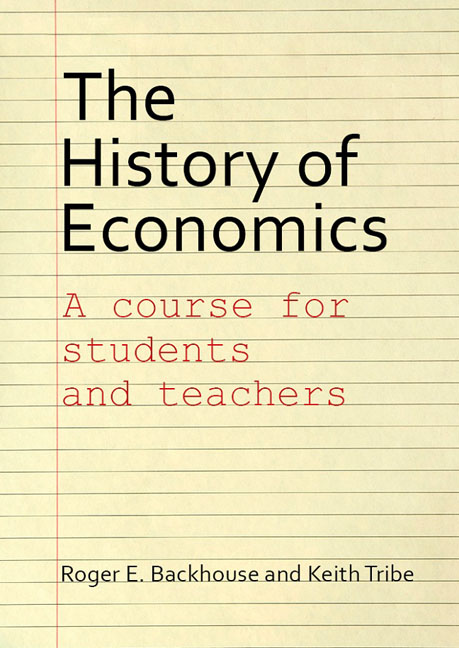Book contents
- Frontmatter
- Contents
- Introduction
- Lecture 1 Commerce, Wealth and Power: The Disputed Foundations of the Strength of a Nation
- Lecture 2 Natural Order, Physiocracy and Reform
- Lecture 3 Adam Smith I: Outline of a Project
- Lecture 4 Adam Smith II: The Two Texts
- Lecture 5 The Political Economy of Malthus and Ricardo
- Lecture 6 Political Economy in Continental Europe and the United States
- Lecture 7 Political Economy, Philosophic Radicalism and John Stuart Mill
- Lecture 8 Popular Political Economy: List, Carey, Bastiat and George
- Lecture 9 Radical Political Economy: Marx and His Sources
- Lecture 10 Marginalism and Subjectivism: Jevons and Edgeworth
- Lecture 11 From Political Economy to Economics
- Lecture 12 Alfred Marshall’s Project
- Lecture 13 Markets and Welfare after Marshall
- Lecture 14 Monetary Economics
- Lecture 15 The Rise of Mathematical Economics
- Lecture 16 Robbins’s Essay and the Definition of Economics
- Lecture 17 John Maynard Keynes
- Lecture 18 Quantitative Economics
- Lecture 19 The Keynesian Revolution
- Lecture 20 Modern Macroeconomics
- Lecture 21 Inflation and the Phillips Curve
- Lecture 22 Popular Economics
- Lecture 23 Economics and Policy
- Lecture 24 Ideology and Place
- Index
Lecture 6 - Political Economy in Continental Europe and the United States
Published online by Cambridge University Press: 09 August 2023
- Frontmatter
- Contents
- Introduction
- Lecture 1 Commerce, Wealth and Power: The Disputed Foundations of the Strength of a Nation
- Lecture 2 Natural Order, Physiocracy and Reform
- Lecture 3 Adam Smith I: Outline of a Project
- Lecture 4 Adam Smith II: The Two Texts
- Lecture 5 The Political Economy of Malthus and Ricardo
- Lecture 6 Political Economy in Continental Europe and the United States
- Lecture 7 Political Economy, Philosophic Radicalism and John Stuart Mill
- Lecture 8 Popular Political Economy: List, Carey, Bastiat and George
- Lecture 9 Radical Political Economy: Marx and His Sources
- Lecture 10 Marginalism and Subjectivism: Jevons and Edgeworth
- Lecture 11 From Political Economy to Economics
- Lecture 12 Alfred Marshall’s Project
- Lecture 13 Markets and Welfare after Marshall
- Lecture 14 Monetary Economics
- Lecture 15 The Rise of Mathematical Economics
- Lecture 16 Robbins’s Essay and the Definition of Economics
- Lecture 17 John Maynard Keynes
- Lecture 18 Quantitative Economics
- Lecture 19 The Keynesian Revolution
- Lecture 20 Modern Macroeconomics
- Lecture 21 Inflation and the Phillips Curve
- Lecture 22 Popular Economics
- Lecture 23 Economics and Policy
- Lecture 24 Ideology and Place
- Index
Summary
Aims of the lecture
1. To broaden the perspective on the development of political economy in Continental Europe and North America during the first half of the nineteenth century.
2. To emphasize the role of the work of Jean-Baptiste Say in these developments.
3. To point up the leading role played by French political economy in the international development of political economy in the first half of the nineteenth century.
Bibliography
Schumpeter’s History of Economic Analysis is the only general text that covers early nineteenth-century Continental European political economy in any detail, although it is notable today for the scope of its coverage rather than the merits of its discussion. A preliminary overview of French and German sources can be found in Keith Tribe, “Continental Political Economy from the Physiocrats to the Marginal Revolution”, in Theodore M. Porter and Dorothy Ross (eds), Cambridge History of Science, volume 7 (Cambridge: Cambridge University Press, 2003), 154–70. Gilbert Faccarello (ed.), Studies in the History of French Political Economy: From Bodin to Walras (London: Routledge, 1998) is the most accessible modern English-language survey of French political economy; while chapters 8 and 9 of Keith Tribe, Governing Economy: The Reformation of German Economic Discourse 1750–1830, second edition (Newbury: Threshold Press, 2017), deal in detail with the early development of Nationalökonomie and the influence of Karl Heinrich Rau through to the later nineteenth century. For the United States, the best general survey remains Joseph Dorfman, The Economic Mind in American Civilization, five volumes (New York: Viking, 1946; new edition 1959).
Central to the story in this and the following lecture are the writings of Jean-Baptiste Say. For his biography see Evert Schoorl, Jean-Baptiste Say: Revolutionary, Entrepreneur, Economist (Abingdon: Routledge, 2013). The political background to his thinking is outlined in Richard Whatmore, Republicanism and the French Revolution: An Intellectual History of Jean-Baptiste Say’s Political Economy (Oxford: Oxford University Press, 2000), while Philippe Steiner, “The Structure of Say’s Economic Writings”, European Journal of the History of Economic Thought 5 (1998), 227–49, gives an overview of his political economy.
- Type
- Chapter
- Information
- The History of EconomicsA Course for Students and Teachers, pp. 95 - 106Publisher: Agenda PublishingPrint publication year: 2017



